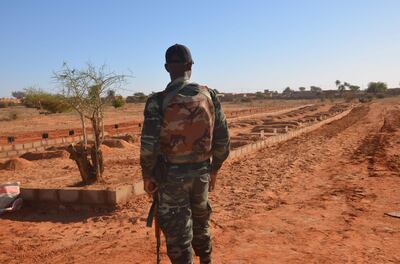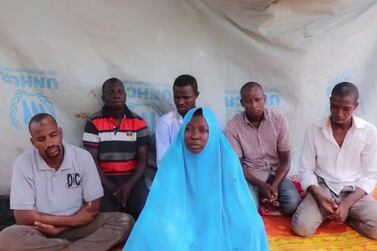French Foreign Minister Jean-Yves Le Drian has warned of an emerging “arc of terrorist groups” running from West Africa to the Middle East.
His comments came after 71 soldiers were killed in Niger in an attack carried out by hundreds of extremists and claimed by ISIS.
Mr Le Drian, speaking to French broadcaster France Inter, said: “What is at stake in the Sahel [sub-Saharan Africa] is … the stability of the territory, but also our own security.”

France’s military presence in sub-Saharan Africa from August 2014 has been criticised by some of its African partners.
In the wake of a helicopter collision that killed 13 French soldiers, President Emmanuel Macron called on leaders of the G5 Sahel group to “clarify” their position on continued French military operations.
Defending the French military presence in the region, Mr Le Drian said: “We are only there to fight terrorism.”
Describing a terror threat stretching from war-torn Mali and the sub-Saharan region of Africa to the Middle East, the foreign minister said that ISIS remained a significant threat.
“Daesh [ISIS] is not dead. Daesh has suffered defeats, but the fact remains that this threat is permanent,” he said.
“We greatly underestimate the risk posed by Daesh fighters,” he added.
Mr Le Drian cautioned that the extremist group could mount a resurgence in Syria: “There are around 10,000 fighters in prison who are ready to resume fighting.”
The comments followed talks in Niger on Sunday attended by the leaders of the G5 Sahel group. A meeting with President Macron, planned for Monday in France, was postponed after the deadly attack on Nigerien forces.
The group, represented by the leaders of Mali, Niger, Chad, Burkina Faso and Mauritania, called for closer cooperation and international support in the battle against extremism in the region.
“The heads of state reiterated their desire to do everything possible to improve joint coordination between the joint forces, the forces of defence and national security, and international allies,” the group said in a statement issued after the summit.
The talks with Mr Macron will now take place early next year.
Earlier in the day, four of the leaders attended a ceremony at an air base in the capital Niamey to pay homage to the 71 Nigerien military personnel killed in the attack claimed by ISIS.

Hundreds of extremists, travelling in trucks and on motorbikes and supported by artillery, assaulted and overran an isolated military camp on December 10.
The attack, in Inates in the western Tillaberi region, was the deadliest on Niger's military since violence began to spill over from neighbouring Mali in 2015, and dealt a blow to efforts to roll back extremism in the Sahel.
Niger has been observing three days of national mourning from Friday to Sunday.
Militant attacks in the Sahel have jumped roughly four-fold this year compared with 2018, according to the Armed Conflict Location & Event Data Project. The group recorded 210 assaults in 2019, compared with 56 last year.







